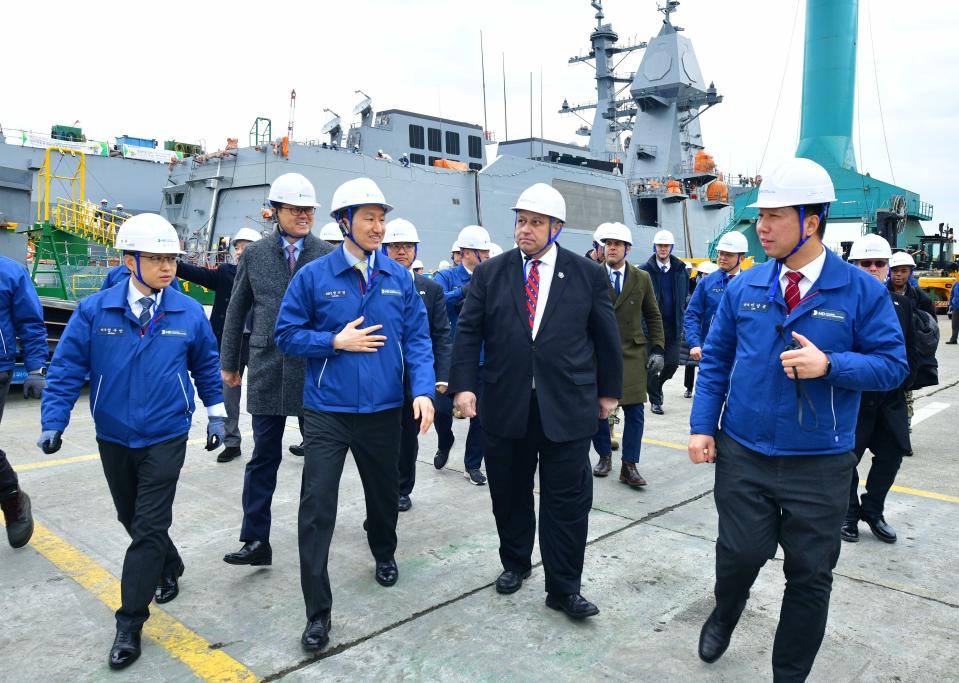US Navy secretary says he was 'floored' by a Pacific ally's shipbuilding abilities amid American warship production woes
The US Navy secretary, Carlos Del Toro, said he was "floored" at South Korea's shipbuilding abilities.
A recent review found that the US Navy's top shipbuilding programs were heavily delayed by years.
Del Toro and other Navy officials addressed US shipbuilding problems in a budget hearing this week.
Amid concerns about American shipbuilding, the US Navy's top civilian official said this week that he was "floored" by a Pacific ally's capabilities in this space.
The Navy secretary's comments came on the heels of an internal review that discovered that most of the Navy's top programs, including high-priority submarines, a first-in-class guided-missile frigate, and the third Ford-class aircraft carrier, were severely delayed by years, fueling worries from US officials about the ability to maintain the country's pace against great power rivals.
During his keynote speech at the Navy League's Sea Air Space conference this week, the secretary of the Navy, Carlos Del Toro, said his recent trip to South Korea had left him impressed by their shipbuilding.
"When my team and I went to South Korea, we were floored at the level of digitization and real-time monitoring of shipbuilding progress, with readily available information down to individual pieces of stock materials," Del Toro said.
"Their top executives could tell us to the day when ships would be delivered," he said. That's a stark difference from the US, which is facing problems with its shipbuilding capacity, labor availability, and resources.
Back in January, Del Toro ordered a 45-day review to assess the progress of the Navy's top shipbuilding programs, which found that most were delayed. After the review's findings were made public, Del Toro ordered a follow-up review into solutions for the delays.

Del Toro paid a visit to South Korea's yards in February, during which he encouraged companies to invest in commercial and naval shipbuilding facilities in the US. He said there were "numerous former shipyard sites around the country which are largely intact and dormant" that were "ripe for redevelopment."
The Navy said at the time that South Korean shipbuilding was "an asset" to the US, especially "as China continues to aggressively pursue worldwide shipbuilding dominance."
That month, Maj. Jeffrey L. Seavy, a retired US Marine Corps officer, wrote for the US Naval Institute that China had roughly 47% of the global market on shipbuilding, the most of any country, with South Korea coming in second at about 29% and Japan in third at about 17%. He said the US had "a relative insignificant capacity at 0.13%," referencing numbers from the United Nations Conference on Trade and Development.
During his recent Sea Air Space speech, Del Toro further praised South Korea and commended Japan, saying both Pacific allies could build high-quality ships on time, on budget, and often at a fraction of the cost.
"It's an ethos, a commitment to constant improvement that is the foundation of their reputation for consistently delivering on time and on budget, even during COVID," he said.
Though some delays have stemmed from the challenge of building first-in-class vessels, the Navy has attributed much of the delays that are bogging down its important shipbuilding programs to the COVID-19 pandemic, adding that residual supply-chain and labor issues have pushed timelines back and ballooned costs.
The Navy is trying to find solutions, though. Hon. Nick Guertin, the Navy's acquisition executive, said the Navy review "identified major initiatives to drive improvement that we plan to pursue."
He told reporters earlier this month: "Our Navy ships exist to strengthen American dominance and deliver war-fighting capability by providing the tools our war-fighters need to operate the world's strongest navy. In order to provide these key war-fighting tools, shipbuilding challenges must be addressed."
Read the original article on Business Insider


